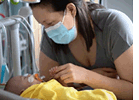Mobile Solutions
Montreal Children’s tests wireless monitoring for babies
October 26, 2022
 MONTREAL – The Montreal Children’s Hospital is testing new wireless technology to monitor the vital signs of its patients in the neonatal ICU. It’s part of a project aimed at improving the lives of the children and health professionals – as well as giving parents better access to their newborns.
MONTREAL – The Montreal Children’s Hospital is testing new wireless technology to monitor the vital signs of its patients in the neonatal ICU. It’s part of a project aimed at improving the lives of the children and health professionals – as well as giving parents better access to their newborns.
Every year in the hospital’s Neonatal Intensive Care Unit (NICU), close to 900 newborns and premature babies depend on wired vital-sign monitors to survive. These monitors track their heart rate, oxygen saturation, temperature and other vital signs.
The monitoring system involves taping five to 10 wires to the baby’s sensitive skin, making it difficult for them to move around. It’s also difficult for their parents to hold and bond with them and for nurses to care for them.
CBC News reported that it’s believed to be the first project of its kind in the country. Called the Smart Hospital Project, it uses new Bluetooth sensors to help remove these barriers in the NICU.
“By eliminating [wires], we hope we’re going to decrease the work that the nurses have to do … but more than that, we’re going to improve the bonding between the parents and the baby,” said Dr. Guilherme Sant’Anna, an associate professor of pediatrics at the McGill University Health Centre (MUHC) and one of three researchers conducting the study.
He said parents are often afraid to hold their babies in the NICU because they fear the wires will disconnect or break. The wireless sensors alleviate that concern and promote more skin-to-skin contact, which Sant’Anna said improves outcomes.
The Bluetooth monitoring system involves only two sensors: a small patch on the baby’s chest and a band around the ankle. These sensors send the same information that the wires do to the monitor, along with even more data not currently recorded, such as the movement and position of the baby.
The absence of wires has made a big difference for parents like Nathalie Nicolas, who is still recovering from her preterm birth. Her baby boy was born at 25 weeks, weighing just 600 grams, and he’s been in hospital for three months.
Nicolas said it was distressing seeing her baby hooked up to at least six wires.
“It’s like a wave of ‘what’s going on, what’s happening with my baby,’“ she said. “It’s really stressful for a parent.”
Throughout the months, Nicolas said trying to hold her baby and dress him while navigating the wires was like playing a game of limbo. She said the wires would get stuck around her son’s toes and nurses would have to duck under them to help untangle them.
Nicolas is now one of more than two dozen parents participating in the wireless monitoring trial. She said the new technology means the world to her family.
“It makes it easier to take your baby in your arms. It makes it easier to dress your baby. It makes it easier to feel a bit more normal,” she said.
The wireless system has been tested in the Children’s NICU for the past four to five months and Sant’Anna says a total of 20 patients have participated. The project is currently comparing the signals acquired by standard wires with the signals acquired by wireless sensors simultaneously to ensure they match.
He said the ultimate goal will be to get babies home earlier where they can be monitored at a distance. Older patients would also be able to benefit from this greater mobility.
“The goal is to get this in most hospitals across Quebec and Canada,” said Sant’Anna.
